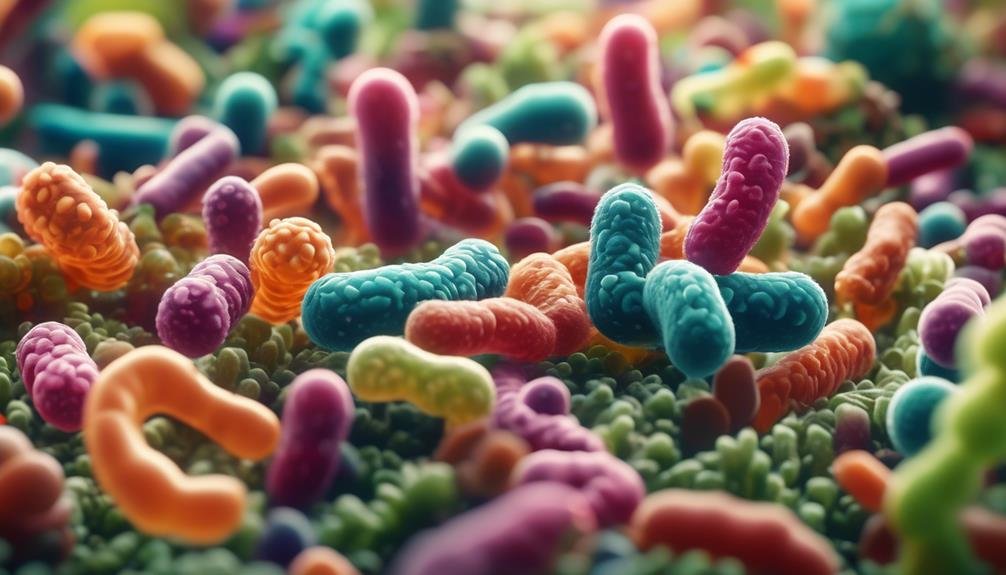"Cherishing Little Steps - A Haven for Baby and Family Journeys"
Digestive Health for Toddlers
Have you ever wondered why some toddlers seem to have more digestive issues than others?
It's a common belief that digestive health in toddlers is influenced by a variety of factors.
But what exactly are these factors and how can they impact your child's overall well-being?
In this discussion, we will explore the common digestive issues faced by toddlers, the importance of a balanced diet, the role of hydration, and the potential benefits of probiotics in promoting a healthy digestive system.
By understanding these factors, you will be equipped with the knowledge to support your toddler's digestive health and ensure their overall wellness.
Key Takeaways
- Picky eating habits and food intolerances can lead to digestive problems in toddlers.
- A balanced and nutritious diet is crucial for digestive health in toddlers.
- Proper hydration is essential for maintaining optimal digestive health in toddlers.
- Probiotics play a significant role in promoting healthy digestion in toddlers.
Common Digestive Issues in Toddlers

Common digestive issues can often impact toddlers, causing discomfort and distress in their daily lives. Two common issues that toddlers may face are picky eating habits and food intolerances.
Picky eating habits refer to the selective and limited food choices exhibited by toddlers, which can lead to nutritional deficiencies and digestive problems. Toddlers may refuse to eat certain foods due to their taste, texture, or color. This can result in inadequate intake of essential nutrients, such as vitamins and minerals, necessary for their growth and development.
Food intolerances, on the other hand, occur when a toddler's digestive system is unable to properly digest certain types of food. This can lead to symptoms such as bloating, gas, diarrhea, or constipation. Common food intolerances in toddlers include lactose intolerance, gluten intolerance, and sensitivities to specific food additives or preservatives. Identifying and managing these intolerances is crucial to ensure the toddler's digestive health and overall wellbeing.
If your toddler is experiencing picky eating habits or food intolerances, it's important to consult a pediatrician or a registered dietitian. They can provide guidance on ensuring a balanced and nutritious diet for your child, as well as recommend appropriate alternatives or modifications to accommodate any food intolerances.
Importance of a Balanced Diet
To ensure optimal digestive health for your toddler, it's crucial to provide them with a balanced diet that meets their nutritional needs. A balanced diet plays a vital role in maintaining a healthy digestive system and promoting overall well-being.
Here are some reasons why a balanced diet is important for your toddler's digestive health:
- Benefits of fiber for toddler's digestion: Including fiber-rich foods such as fruits, vegetables, whole grains, and legumes in your toddler's diet can promote healthy digestion. Fiber adds bulk to the stool and helps regulate bowel movements, preventing constipation.
- The impact of food allergies on digestive health: Food allergies can significantly impact your toddler's digestive system. It's important to identify and avoid foods that your toddler may be allergic to, as consuming these foods can lead to digestive issues such as diarrhea, abdominal pain, and bloating.
- Nutritional adequacy: A balanced diet ensures that your toddler receives all the essential nutrients, vitamins, and minerals necessary for proper digestion and growth. It's important to offer a variety of foods from different food groups to ensure nutritional adequacy.
- Gut microbiota health: A balanced diet supports the growth of beneficial bacteria in your toddler's gut, which plays a crucial role in digestion and nutrient absorption. Including probiotic-rich foods like yogurt in your toddler's diet can help maintain a healthy gut microbiota.
- Long-term health benefits: Providing your toddler with a balanced diet promotes long-term digestive health and reduces the risk of developing digestive disorders later in life.
Hydration and Digestive Health

Ensuring proper hydration is essential for maintaining optimal digestive health in toddlers. Water intake plays a crucial role in promoting the healthy functioning of the digestive system. It helps break down food, aids in the absorption of nutrients, and prevents constipation. Toddlers have higher water requirements compared to adults due to their smaller body size and higher metabolic rate. It's important to encourage your toddler to drink enough water throughout the day.
The importance of water intake can't be overstated. Dehydration can negatively impact digestion and lead to various gastrointestinal problems. Signs of dehydration in toddlers include dry mouth, decreased urine output, dark-colored urine, fatigue, and irritability. It's important to monitor your child's hydration status and ensure they're drinking enough fluids.
To ensure adequate hydration, offer your toddler water regularly throughout the day, especially during meals and playtime. Limit sugary drinks as they can contribute to dehydration and negatively affect digestive health. Encourage your child to drink water even when they aren't thirsty, as thirst isn't always a reliable indicator of hydration status.
The Role of Probiotics in Toddler's Digestion
Probiotics play a crucial role in supporting and maintaining optimal digestion in toddlers. These beneficial bacteria offer a range of benefits that can help improve your toddler's digestive health and overall well-being.
Here are some key reasons why probiotics are important for your little one:
- Boosts Immunity: Probiotics can strengthen your toddler's immune system, reducing the risk of common illnesses and infections.
- Reduces Digestive Issues: Probiotics can alleviate symptoms of digestive problems such as constipation, diarrhea, and bloating, promoting regular bowel movements.
- Enhances Nutrient Absorption: Probiotics help break down food and absorb essential nutrients more efficiently, ensuring your toddler gets the maximum nutritional value from their diet.
- Supports Gut Health: Probiotics promote a healthy balance of gut bacteria, which is essential for proper digestion and maintaining a strong intestinal barrier.
- Improves Mental Health: Research suggests that probiotics may have a positive impact on mental well-being in toddlers, potentially reducing symptoms of anxiety and depression.
To ensure your toddler receives the benefits of probiotics, you may consider incorporating probiotic supplements into their daily routine. However, it's always best to consult with your pediatrician before starting any new supplements.
Additionally, focus on including probiotic-rich foods in their diet, such as yogurt, kefir, sauerkraut, and other fermented foods. By prioritizing your toddler's digestive health with probiotics, you can help them thrive and support their overall development.
Promoting Healthy Gut Bacteria

Promoting healthy gut bacteria is essential for maintaining optimal digestion and overall well-being in toddlers, building upon the benefits that probiotics provide. One way to promote a healthy gut microbiome is by incorporating gut-friendly foods into your toddler's diet. These foods are rich in fiber and promote the growth of beneficial bacteria in the gut. Examples of gut-friendly foods for toddlers include fruits, vegetables, whole grains, and yogurt.
Another factor to consider is the impact of antibiotics on gut bacteria in toddlers. Antibiotics are often prescribed to treat bacterial infections, but they can also disrupt the balance of bacteria in the gut. This disruption can lead to digestive issues, such as diarrhea or constipation. To minimize the impact of antibiotics on your toddler's gut bacteria, it's important to only use antibiotics when necessary and to follow the prescribed dosage.
In addition to incorporating gut-friendly foods and being mindful of antibiotic use, there are other ways to promote a healthy gut microbiome in toddlers. Breastfeeding, for example, is known to support the growth of beneficial bacteria in the gut. Regular physical activity and stress reduction techniques, such as playtime and relaxation exercises, can also contribute to a healthy gut.
Tips for Preventing Digestive Problems
To prevent digestive problems in your toddler, it's important to establish a balanced and nutritious diet. By following these preventive measures and dietary guidelines, you can ensure your little one's digestive health:
- Provide a variety of fruits and vegetables to promote regular bowel movements and prevent constipation.
- Offer whole grains such as brown rice and whole wheat bread, which are high in fiber and aid in proper digestion.
- Limit sugary and processed foods, as they can disrupt the natural balance of gut bacteria and lead to digestive issues.
- Encourage your child to drink plenty of water throughout the day to prevent dehydration and maintain optimal digestion.
- Introduce probiotic-rich foods like yogurt and kefir, which contain beneficial bacteria that support a healthy gut.
Frequently Asked Questions
Can Teething Cause Digestive Problems in Toddlers?
Teething can sometimes cause digestive problems in toddlers. The discomfort from teething can lead to changes in appetite and bowel movements. There are remedies available to help alleviate teething pain and support digestive health.
What Are Some Common Warning Signs of a Digestive Problem in Toddlers?
You may notice warning signs of digestive problems in toddlers, like tummy troubles, frequent gas, or changes in bowel movements. Teething can sometimes affect their digestion, so pay attention to any changes.
How Can a Toddler's Diet Affect Their Digestive Health in the Long Term?
Eating a balanced diet is crucial for your toddler's digestive health in the long term. It promotes a healthy gut microbiome, which aids in digestion and nutrient absorption. Make sure they get a variety of fruits, vegetables, whole grains, and lean proteins.
Are There Any Natural Remedies or Home Remedies to Help With Toddler Digestive Issues?
If your toddler is experiencing digestive issues, there are natural and home remedies that can help. Natural remedies like chamomile tea and ginger can soothe the stomach, while home remedies like a warm bath can aid in digestion.
Can Stress or Anxiety Impact a Toddler's Digestion?
Stress and anxiety can definitely impact a toddler's digestion. It's important to understand the link between emotional well-being and digestive health. Additionally, teething can also contribute to digestive problems in toddlers.
Conclusion
In conclusion, maintaining good digestive health in toddlers is crucial for their overall well-being.
One interesting statistic to note is that approximately 25% of toddlers experience digestive issues, such as constipation or diarrhea, at some point during their early years.
By ensuring a balanced diet, proper hydration, and incorporating probiotics into their routine, parents can help promote a healthy gut and prevent digestive problems in their little ones.


